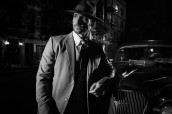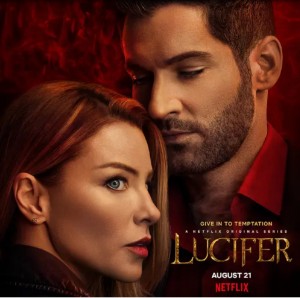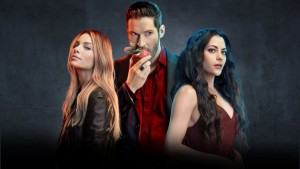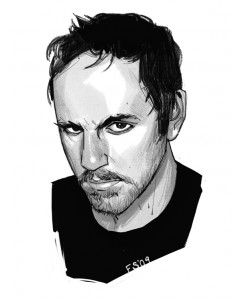In Part 3 of this exclusive four-part interview with Mike Costa, co-executive producer/writer on LUCIFER, which is currently streaming on Netflix, he talks about having series regulars play other roles in the black-and-white Season 5 episode, the decision to finally have leads Lucifer (Tom Ellis) and Chloe Decker (Lauren German) get together romantically, and more.
AX: With “It Never Ends Well for the Chicken,” the black-and-white Season 5 episode set in the ‘40s, did the story come up first, and then the writers thought, “Oh, we should do this in black-and-white,” or were you looking to do something in black-and-white and wrote towards that?
COSTA: Actually, that wasn’t something that was floating around the way that, like I said, some episode ideas are. For instance, I wrote an episode in Season 4 where everyone is taken hostage at Lux. And that was an episode idea that we had in Season 1. “We should do the episode where everyone is taken hostage in Lux.” And then we finally did get to it.
But the ‘40s episode is not one of those. It definitely came out of, “What will the story be?” When we realized that we had this opportunity to finally tell the story of what Lucifer’s ring is, like every episode, we had to start from scratch. We say, “Well, what is the story? How do we tell it? Do we find out because we meet somebody who knows, or does he know what it is?” And then we realized that it will come out of a story that Lucifer is telling Trixie [Chloe’s young daughter, played by Scarlett Estevez], and we can set it in any era we want, and it can become the story of Lilith [mother of demons, played by series regular Lesley-Ann Brandt, who also plays the demon Mazikeen]. And we quickly focused on the ‘40s. We said, “We’ll do it like a noir.”
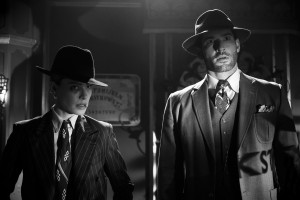
Lauren German as Chloe Decker and Tom Ellis as Lucifer in LUCIFER – Season 5 – “It Never Ends Well For the Chicken” |©2020 Netflix/John P. Fleenor
We kind of touched on that idea in Season 3, which was an episode I wrote called “The Last Heartbreak,” where we have three scenes that take place in the 1950s, when the character of Cain, played by Tom Welling, was a detective in the Los Angeles Police Department. We actually shot those with older lighting. Our d.p., Tom Camarda, was really excited, and used all these old lighting [techniques and equipment], so it does have a sort of different look, but not as dramatic as we would have hoped. So when we landed on the idea that we were going to do it in the ‘40s, we were like, “We’re going to shoot it in black-and-white.” And we’re very blessed with a studio and a network that let us do off-the-wall things like that, and make our show look different for an entire episode. They were totally on board. But it all came out of the story itself. It was not something that we had been wanting to do for a while, it came out of, “How do you tell that story?”
AX: In that episode, you have a lot of series regulars playing other characters in the story, including two women playing men. Did you ask everybody who they’d like to play, or did you just sort of cast it like a repertory show of, “Well, this is what we’re doing, and these are our actors, and these are the people best suited to this, this, and this”?
COSTA: We knew that, early on, Lucifer would have to team up with a detective, and so obviously, that’s going to be Lauren. That was the one obvious thing – it’s going to be the two of them solving something, and it’s going to be Lauren. But after that, it just becomes, “Okay, who is [Kevin Alejandro, who normally plays detective Daniel Espinosa] going to be? What characters can we make these people that will be fun for the audience to see, and fun for the actors to play?” And that’s where the idea [came from] of Aimee [Garcia, who normally portrays coroner Ella Lopez] playing this crime boss, with her little pencil moustache. That was maybe the most outlandish character choice. But we knew Aimee was going to nail it. She had to take the biggest swing. She’s doing this whole other voice, and she loved it. And we knew that character was only really going to be in one scene, and then he’s dead, and we were like, “Go, baby. Do what you feel like this character would do.” [laughs]
So, it really became a game of inventing characters for our cast to play. We were starting from scratch, so we can run into anybody in this world, so who will those people be, and who will play them? The other thing is, Rachael [Harris, who is a series regular as psychotherapist Linda] playing the bartender, it was an obvious choice, because psychoanalysis was very basic in those days. People didn’t really go to therapists the way they do today. But people did talk to bartenders, so that seemed like a similar role for her, because it’s sort of similar. So that was the thought process there – who can be what kind of character?
Lauren’s character came up first, because we knew that if we were going to a 1940s flashback, Lucifer was not solving crimes at the time. He didn’t start doing that until he started working with Chloe. This is not something that he would just do on his own, so he would need to partner up with a detective. That was a very early idea for how the story could work.
I am a huge fan of noir detective fiction, and particularly that era of detective fiction, the ‘40s and ‘50s. I’m a gigantic James Ellroy fan, and that’s why I was excited to write “The Last Heartbreak,” which had scenes set in the ‘50s, and there are different references to James Ellroy in those scenes. Our writer Aiyana White wrote the 1940s episode, and I think she did an incredible job. She probably did a better job than I would’ve. I’m a little envious of it. But if Laura was going to play the character, there were no female private eyes at the time. Or if there were, I’m sure it was an incredibly rare, unusual situation. So it just came out of the concept of, he wouldn’t find a woman detective. And also, it would just be strange and unlikely to say, “Oh, and it happened to look like Lauren.” Having Lesley-Ann play Lilith made sense, because Maze is her daughter. But all these other people, it would begin to seem odd.
So, it became a device where we decided that we were going to populate these characters with our cast, and our excuse for it would be the PRINCESS BRIDE device of Trixie asking questions, and you’re realizing that Lucifer is tailoring this story to Trixie, and filling this story with a WIZARD OF OZ-esque, “You were there, and you!” So, when we came up with that concept, it seems very fun to say, well, he’s going to meet this detective, and he’s going to be your standard, hardboiled, sloppy, untucked shirt guy who probably drinks too much, sitting behind a desk. And then Trixie is going to be, “Well, why does it have to be a boy?” And then it will be Lauren. And that will give Lauren a whole other kind of character that she gets to play. She’s not playing Chloe, she’s playing Jack, she’s playing a different person. And she was really excited about that idea. You have an actor playing the same character for six years, the idea of playing a new character is very fun.
AX: There’s a LUCIFER musical episode coming up in the second half of Season 5. Is it original songs, or is it a jukebox musical?
COSTA: It’s a jukebox musical. We’re really good and very efficient, and we’re on time, and we have never had a late script, and we do the work and we get it done, but the prospect of writing seven original songs, it was just a little too outside the wheelhouse, even for us. I know that there are shows that do it, and I honestly don’t know how they do it, because the amount of work that that seems to take is so tremendous. And also, once you see it, you’ll understand why it’s a jukebox musical and not an original. It actually is a point of a plot why it’s a jukebox musical.
COSTA: Ildy Modrovich, our co-show runner who wrote the musical episode, is a musician who was in a band back in the day, in her youth. So, I don’t think it’s lack of talent or ability [that the episode uses pre-existing songs]. It’s just more like, this was the right thing for the episode to be a jukebox musical, for a lot of reasons.
AX: Why was it decided to have Chloe and Lucifer finally get together romantically and Dan find out that Lucifer is the Devil in the same episode?
COSTA: Well, initially, all of that was going to happen in ten episodes, which is not a lot of time when you have so much ground to cover. But when we were able to gain those extra six [episodes in Season 5], we had a lot more time to let certain story points breathe, and separate them out. But then we had the extra structural issue of, we knew we were going to break it in half, eight and eight.
There is a lot of debate when you start a season. You come in saying, “Okay, we’re going to meet God this season.” You know that will happen. But where will it happen? Will he show up in Episode 1? Will he show up right before the end? Those are questions that we spend a lot of time talking about, figuring out the shape of what the story will be. So, it became pretty clear, once we knew that we were going to break the season into two parts, that the shape that felt right was God showing up at the end of Episode 8, and giving us that cliffhanger to lead us through the hiatus. And then we pick up again in Episode 9, and now God is here. But once we knew that God was showing up in Episode 8, that made the rest of the story have to fall in a certain kind of pattern, because Michael has to create a situation that causes enough chaos that causes God to show up. And that means that everything that Michael does has to happen in those first eight episodes, and all the chickens have to come home to roost. One of the things that we knew was going to happen was that Michael was going to effect Dan seeing Lucifer for who he really is, and using Dan as a tool to attack Lucifer, and so that all had to happen the way it did.
Also, there’s a lot of talk in television about the MOONLIGHTING problem. You spend years of will they-won’t they, and then finally, they get together, and then, does that ruin the show? Does it kill the show when all the tension is gone, and the conflict, and the two leads are together? And we talked about that quite a bit. Because obviously, if you watch LUCIFER, we’ve had a lot of stops and starts of Lucifer and Chloe feeling like they’re getting together, and then something happens that tears them apart. And we finally felt like, look, we’ve teased the audience with this enough. We’re just going to get them together. And we have enough faith in our characters, and in the world stories that we’ve built, that Lucifer and Chloe getting together will not feel like the end of the show.
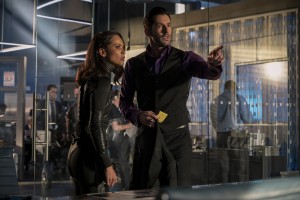
Lesley-Ann Brandt as Maze and Tom Ellis as Lucifer in LUCIFER – Season 5 – “It Never Ends Well For the Chicken” |©2020 Netflix/John P. Fleenor
So, it just so happened to fall out that, yes, they officially get together in the same episode that Dan shows up to shoot Lucifer. Though, again, that was discussed quite a bit. It is two big events in one episode. One, we hope that’s surprising. Because traditionally, you would expect only one big event per episode. And two, it felt like the right way to put stakes on that story, because the real consequence of Dan showing up and shooting Lucifer is that you see that Lucifer is now invulnerable. Whereas previously, he was always vulnerable around Chloe, but now that they’re actually together, suddenly he’s invulnerable. What does that mean? And what does that mean for their relationship?
Because that was also a crucial thing that had to happen after they were together. So, all of these things sort of joined together in a very complicated jigsaw puzzle. And this is what we’re doing all day for weeks, as we’re putting these episodes together, is figuring out how [these story elements] affected different events, react off of one another. And so, we did realize at a certain point, wow, this is all going to happen in one episode, but it felt like the right thing to do.
AX: Also, with MOONLIGHTING, the show was just those two characters, they weren’t dealing with Heaven and Hell, and a larger universe. You also had two actors who, by all accounts, didn’t get along particularly well, so the more you put them together, the more that was likely to be evident …
COSTA: I think you’re spot-on there. I think the MOONLIGHTING thing has become this just hollow cliché that doesn’t really mean anything anymore. Because you’re right, it only really describes a very specific situation that people are acting as though it applies to a larger context, and it probably doesn’t. I mean, it is something that we do consider, because romantic tension is a huge part of the show, and it’s something the fans really enjoy, even though they say they hate it, and they hate it every time that Lucifer goes in for a kiss, but something happens and Chloe checks her phone. And we sort of have a nod to that, which is, Chloe throws her phone away in that moment. Because there were so many times where something romantic was going to happen, but Chloe gets a call, or Chloe gets distracted, and so we wanted to hang a lantern on it. Chloe is throwing the phone away. We know that this is not going to get interrupted. But like I said, we have characters and a world that’s rich enough that we can change the status quo in that way.
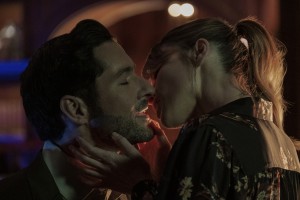
Tom Ellis as Lucifer and Lauren German as Chloe Decker in LUCIFER – Season 5 – “Lucifer! Lucifer! Lucifer!” |©2020 Netflix/John P. Fleenor
We’ve already changed the status quo in a major way when we had Chloe find out that Lucifer was the Devil, and that was not something that we decided very lightly. That was something that we talked about for months and months, and debated back and forth – what does that mean for the show? Does it change it too much? And so, we do think these things out. We do have a lot of discussions about all of the major events that happen on the show.
AX: When Chloe and Lucifer finally did get together, how much discussion was there about how explicit or not explicit to make that love scene?
COSTA: That was one of our most discussed scenes, for sure. One, because of how we want to present that to the audience, and what that will mean. But then also, to make sure the actors are comfortable. Those love scenes, because they are physical, they are not so different from scenes that are full of complicated stunts, because they’re actors that are physically interacting with one another, and you want to make sure that your actors are as safe and comfortable as possible.
Richard Speight, who is another director who directs a lot of episodes of our show, directed that episode. And he’s good friends with Tom outside of the show, and he’s sort of a member of the family, if you will. And so, he came in very early [for pre-production], and there was a lot of conversation of how to exactly choreograph it. We did not leave it to chance on the day and say, “Oh, just go!” We really worked out what every move was going to be, so that, like I said, [it was treated like] a stunt. At any moment, Tom and Lauren knew exactly what was going to happen, who was going to be doing what, where the camera was going to be. It was very carefully choreographed for a lot of different reasons.
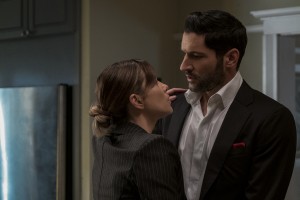
Lauren German as Chloe Decker and Tom Ellis as Lucifer in LUCIFER – Season 5 – “Really Sad Devil Guy” |©2020 Netflix/John P. Fleenor
And it’s just the right thing to do when you do scenes like that. Hollywood is slowly coming around to this idea, and now, in the same way that we have stunt coordinators, there are coordinators for intimate scenes that are there to make sure that the actors feel safe, that nobody feels exploited, or talked into doing something they don’t want to do. Like I said, we are a close-knit group, and we don’t want anybody to feel like they’re being pressured into doing things that make them uncomfortable, so there was a lot of talk about how that was going to look, and what that was going to be.
Related: LUCIFER: Exclusive interview with Co-executive producer Mike Costa on Season 5 – Part 2
Related: LUCIFER: Exclusive interview with Co-executive producer Mike Costa on Season 5 – Part 1
Related: LUCIFER: Exclusive interview with Kevin Alejandro on Season 4 – Part 1
Related: LUCIFER: Exclusive interview with showrunner Joe Henderson on Season 4 and Season 5 – Part 2
Related: LUCIFER: Exclusive interview with showrunner Joe Henderson on Season 4 and Netflix – Part 1
Related: LUCIFER: Exclusive interview with Tricia Helfer on playing the Supreme Goddess on Season 3
Related: LUCIFER: Exclusive interview with actress Aimee Garcia on Season 3
Related: LUCIFER: Exclusive interview with Kevin Alejandro on Season 3
Related: LUCIFER: Showrunner and executive producer Joe Henderson on Season 3 – Exclusive Interview – Part 1
Related: LUCIFER: Joe Henderson and Ildy Modrovich on Season 2 – exclusive interview
Related: LUCIFER: Kevin Alejandro chats about his rivalry with the devil – exclusive interview
Related: LUCIFER: Lauren German on working with the Devil – exclusive interview
Related: LUCIFER: Jonathan Littman on having fun with the devil – exclusive interview
Follow us on Twitter at ASSIGNMENT X
Fan us on Facebook at ASSIGNMENT X
Article Source: Assignment X
Article: LUCIFER: Exclusive interview with Co-executive producer Mike Costa on Season 5 and Lucifer and Chloe finally getting together – Part 3
Related Posts:




